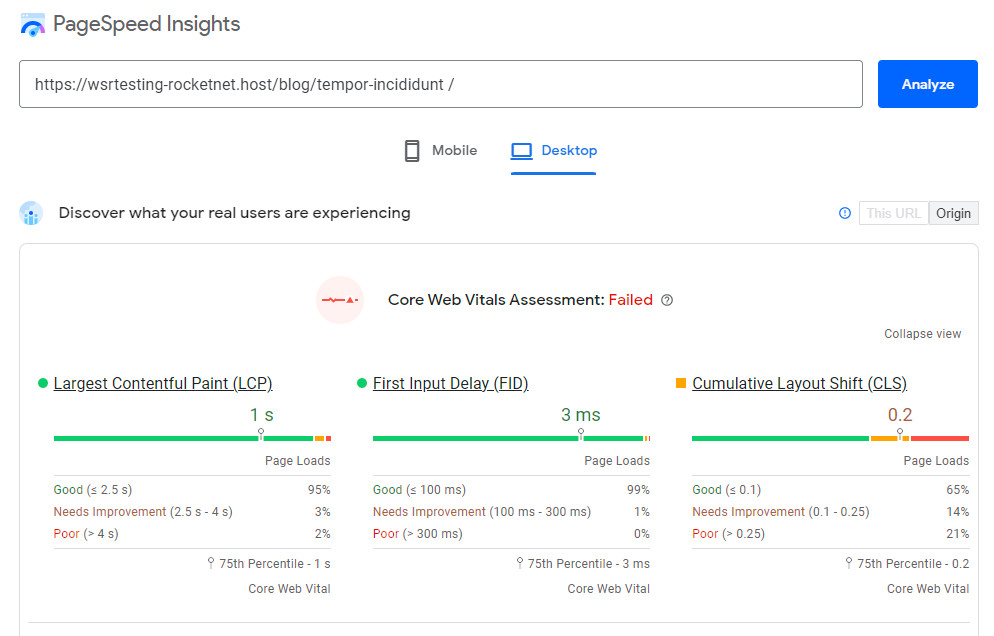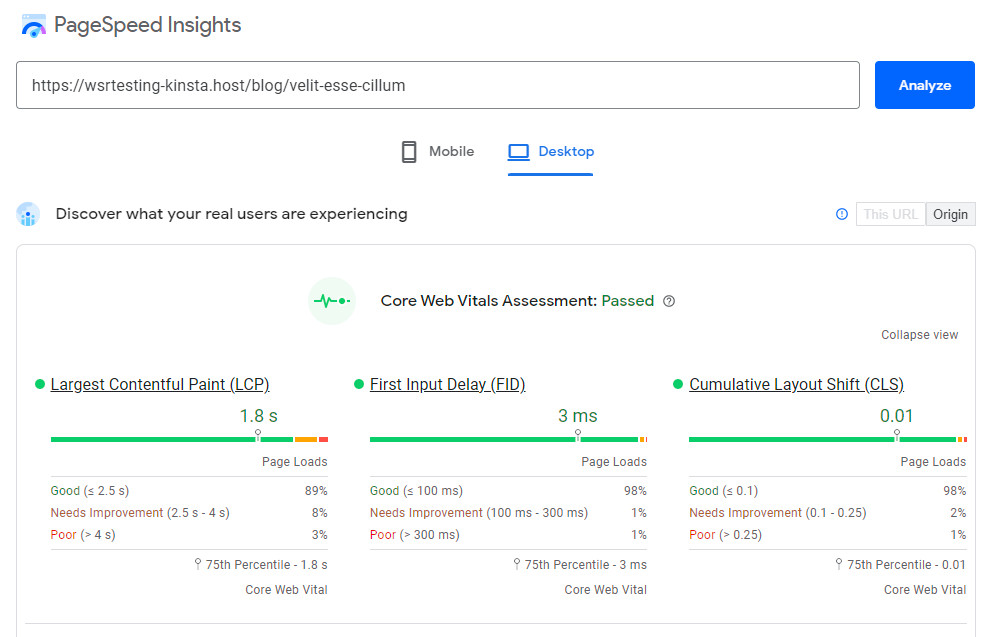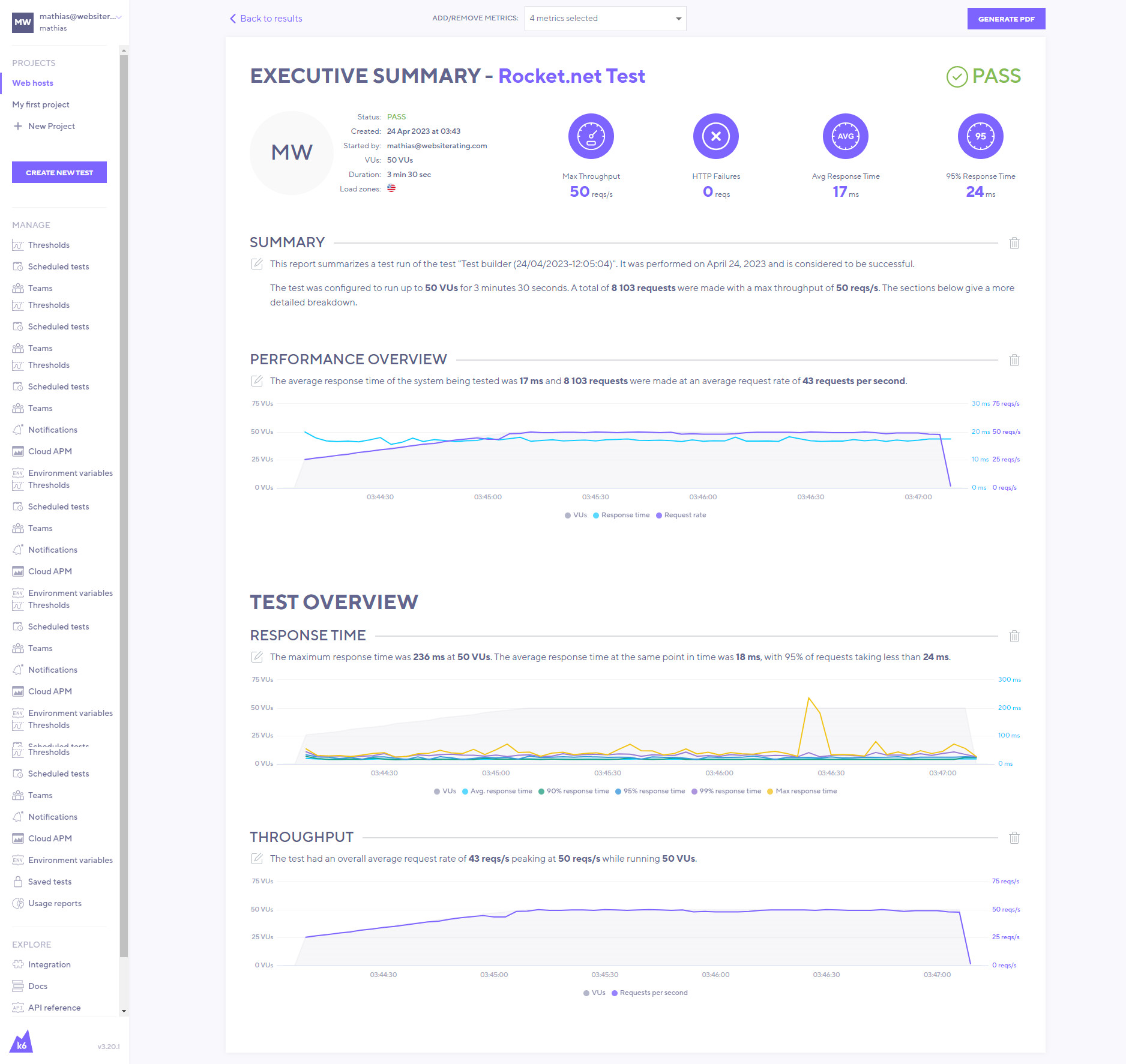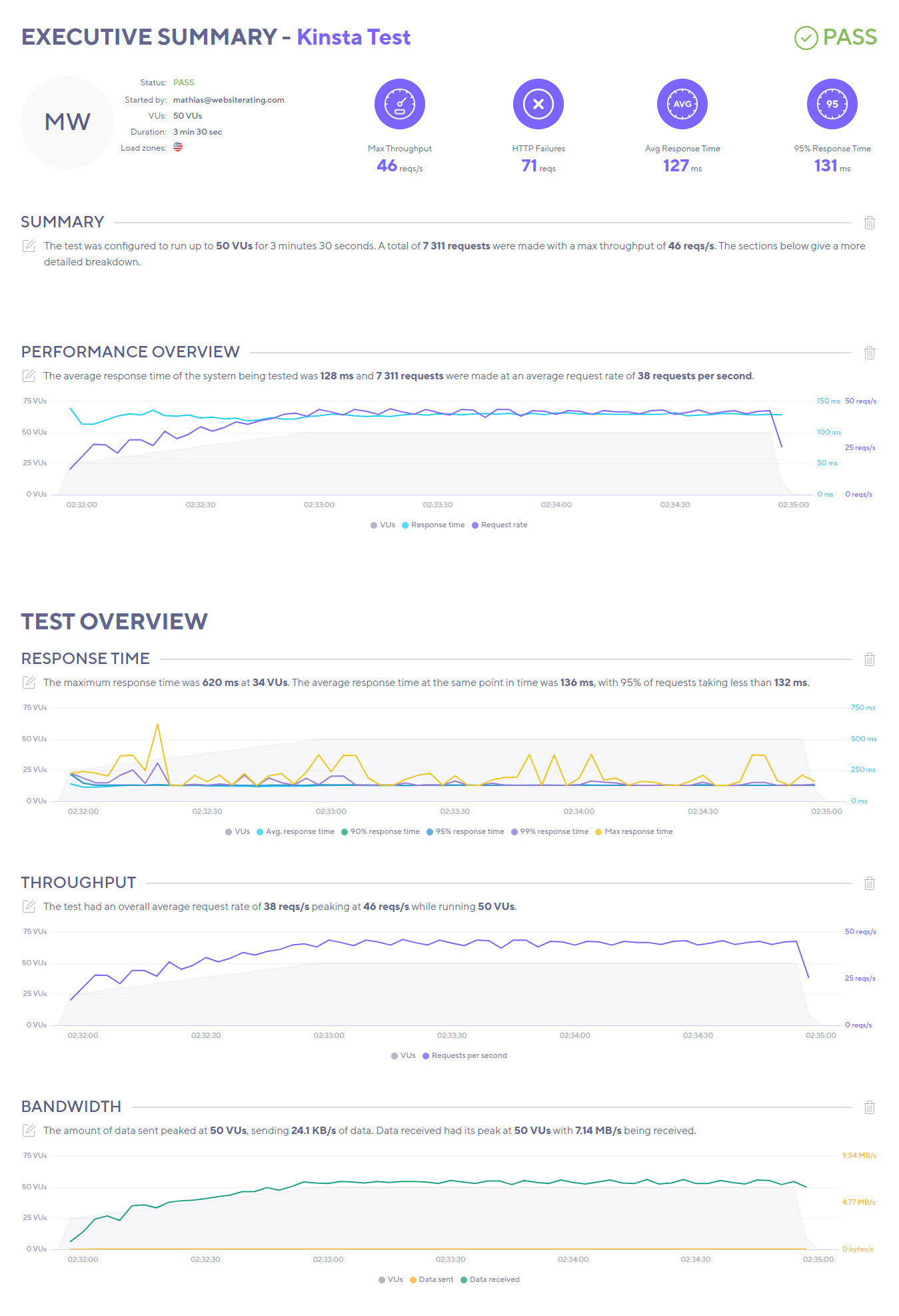This Rocket.net vs Kinsta comparison gives you a detailed, data-driven review of these two managed WordPress hosting services across performance metrics to help you decide which one best meets your needs. Let’s dive into the specifics to understand how Rocket.net stacks up against Kinsta.
I’m on a mission. A mission to put two of the best managed WordPress hosting companies to trial and then pit them against each other.
 Rocket.net |  Kinsta | |
|---|---|---|
| Pricing | From $25/month | From $35/month |
| SLA | 99.9% uptime | 99.9% uptime |
| Hosting types offered | Managed WordPress and WooCommerce hosting, reseller, and enterprise hosting services. | Managed WordPress and WooCommerce hosting, apps and database hosting. |
| Speed and performance | Cloudflare Enterprise. Built-in CDN (content delivery network). WAF and edge caching. NVMe SSD storage. Unlimited PHP Workers. Free Redis & Object Cache Pro | SSD storage. HTTP/3. LXD containers. PHP 8.0 and 8.1. MariaDB. Edge caching. Cloudflare CDN. Early Hints. |
| WordPress | 1-click WordPress installs. Free site migration. Automatic updates. | 1-click installs. Automatic updates. 1-click staging. Free DevKinsta. Unlimited free migrations. |
| Servers | Apache + Nginx. Cloudflare Enterprise | Google Cloud Platform |
| Security | Unlimited free SSL certificates. Automatic daily backups with 14-day retention. 100% PCI compliant. Full activity logs. | DDoS protection. Automatic SSL certificates. Automatic daily backups and 14-day retention. HTTP/3 support. Hack-free guarantee. |
| Control Panel | Rocket.net (proprietary) | MyKinsta (proprietary) |
| Customer Support | 24/7 live chat and phone support | 24/7 live chat and phone support |
| Money-back guarantee | 30 days | 30 days |
| Current deal | 🔥 Ready for speed? Let Rocket do a FREE test migration for you! | 🔥 Pay yearly & get 2 months of FREE hosting |
Key Takeaways:
If price, speed, performance, and support are your main priorities, Rocket.net is an excellent choice, given its demonstrated superiority in key performance metrics such as response time, load time, and request handling capacity.
If security is your main priority, Kinsta should be your preferred choice, as it is known for its robust security features, even though these specific aspects were not covered in the presented data.
Think of it like the Battle Royale of hosting platforms, only a little techier.
Why on earth am I doing this? Well, if you’re anything like me, it’s easy to get bamboozled by the sheer number of features and technical bits and pieces that each platform offers. They all sound great, and indeed a lot of them are. But, as with anything, some are better than others.
My mission, therefore, allows me to go deep into the detail about which platform is the better choice and lets you make an informed decision about which one to pick.
Today’s battle is the mighty Rocket.net vs Kinsta. Both are highly respected platforms with a superior stack of technology to back them up.
So which one has the edge? Let’s find out.
Plans & Pricing
First we’re going to take a look at cost. If we compare the two providers purely on pricing, we can quickly see who comes out on top.
Rocket.net Pricing Plans
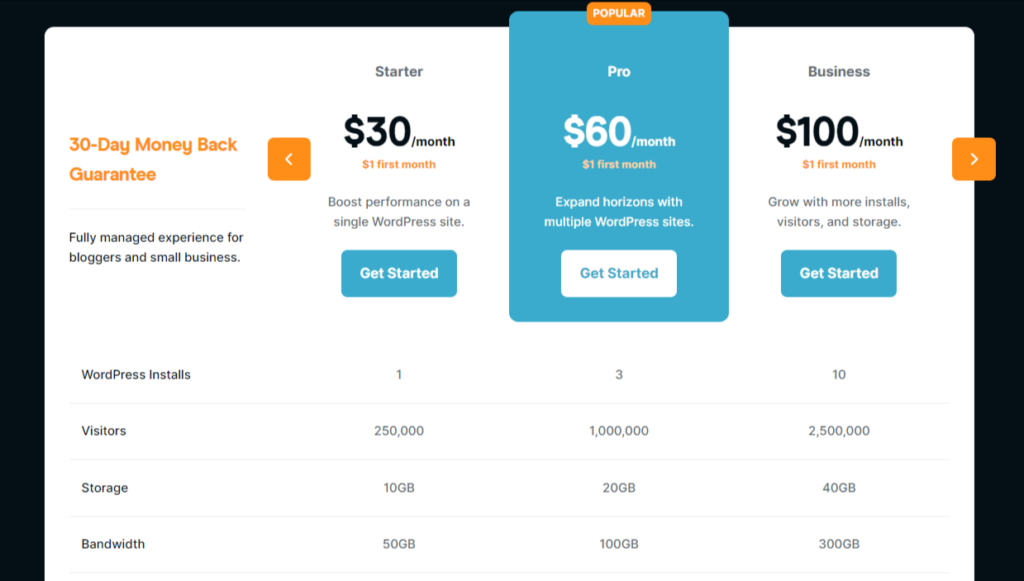
Rocket.net offers three plans for managed WordPress hosting, agency hosting, and enterprise hosting:
Managed hosting:
- Starter: $25/month; $1 the first month
- Pro: $50/month; $1 the first month
- Business: $83/month; $1 the first month
Agency hosting:
- Tier 1: $100 per month; $1 the first month
- Tier 2: $200 per month; $1 the first month
- Tier 3: $300 per month; $1 the first month
Enterprise hosting:
- Enterprise 1: $649 per month
- Enterprise 2: $1299 per month
- Enterprise 3: $1949 per month
Rocket also has an introductory promotional rate where you can get your first month of hosting for just $1 and paying annually provides two months for free. All plans also come with a 30-day money-back guarantee.
Visit Rocket.net for more information and their latest deals… or check out my review of Rocket.net here.
Kinsta Pricing Plans
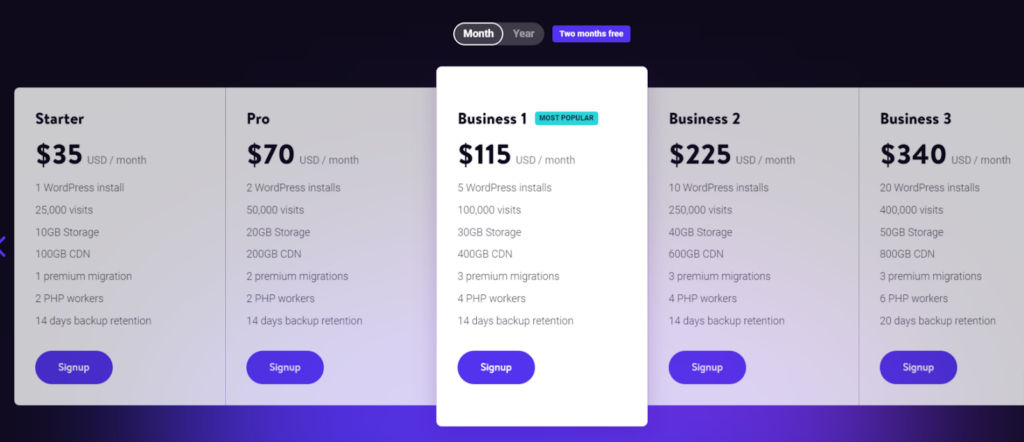
Kinsta features ten different pricing plans for managed WordPress hosting. The detail is a whole article’s worth, so here’s a quick overview of what you can expect to pay:
- Starter: $35/month
- Pro: $70/month
- Business 1: $115/month
- Business 2: $225/month
- Enterprise 1: $675/month
- Enterprise 2: $1000/month
Choosing to pay annually rather than monthly provides you with two month’s worth of service for free. All Kinsta plans provide a 30-day money-back guarantee.
Right now, Kinsta has a limited offer — you can get WordPress hosting from them for free for one month. Also, you’ll get $20 off for a limited time if you subscribe to any plan, and if you’d like to test out Kinsta before subscribing, you can request a demo and find out precisely what it offers.
There are optional add-ons, but they are somewhat technical and not really necessary for the average user.
Visit Kinsta for more information and their latest deals… or check out my review of Kinsta here.
🏆 Winner is Rocket.net
Neither Kinsta nor Rocket are particularly cheap. But you definitely get what you pay for! Both plans provide a two-month discount for paying annually and have a 30-day guarantee.
However, Rocket takes the edge as its plans are a little cheaper than Kinsta, plus you can get your first month for $1.
Performance, Speed & Reliability
Now let’s see what you actually get for the price you pay. First up is performance. A hosting provider needs to excel in this department. Otherwise, they’re not going to stay in business very long.
In this section, you will find out…
- Why site speed matters… a lot!
- How fast a site hosted on Rocket.net and Kinsta loads. We will test their speed and server response time against Google’s Core Web Vitals metrics.
- How a site hosted on Rocket.net and Kinsta performs with traffic spikes. We will test how they perform when faced with increased site traffic.
The most important performance metric that you should look for in a web host is speed. Visitors to your site expect it to load fast instant. Site speed not only affects user experience on your site, but it also affects your SEO, Google rankings, and conversion rates.
But, testing site speed against Google’s Core Web Vitals metrics isn’t enough on its own, as our testing site does not have substantial traffic volume. To evaluate the efficiency (or inefficiency) of the web host’s servers when faced with increased site traffic, we use a testing tool called K6 (formerly called LoadImpact) to send virtual users (VU) to our test site.
Why Site Speed Matters
Did you know that:
- Pages that loaded in 2.4 seconds had a 1.9% conversion rate.
- At 3.3 seconds, the conversion rate was 1.5%.
- At 4.2 seconds, the conversion rate was less than 1%.
- At 5.7+ seconds, the conversion rate was 0.6%.
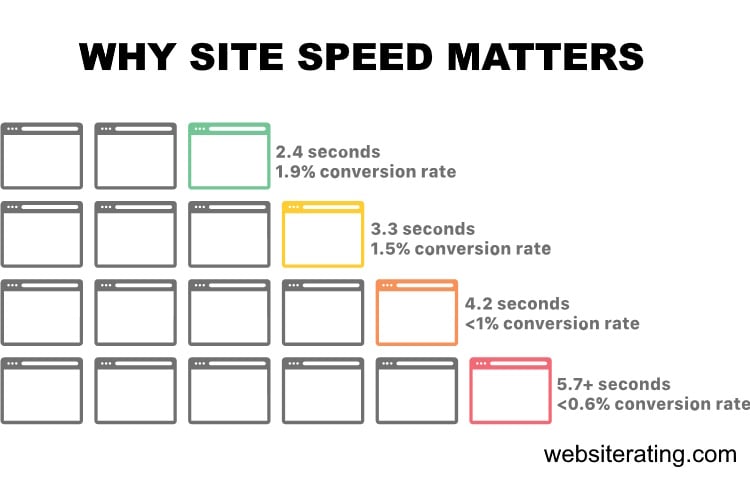
When people leave your website, you lose not only potential revenue but also all the money and time you spent generating traffic to your website.
And if you want to get to the first page of Google and stay there, you need a website that loads up fast.
Google’s algorithms prefer displaying websites that offer a great user experience (and site speed is a huge factor). In Google’s eyes, a website that offers a good user experience generally has a lower bounce rate and loads up fast.
If your website is slow, most visitors will bounce back, resulting in a loss in search engine rankings. Also, your website needs to load up fast if you want to convert more visitors into paying customers.
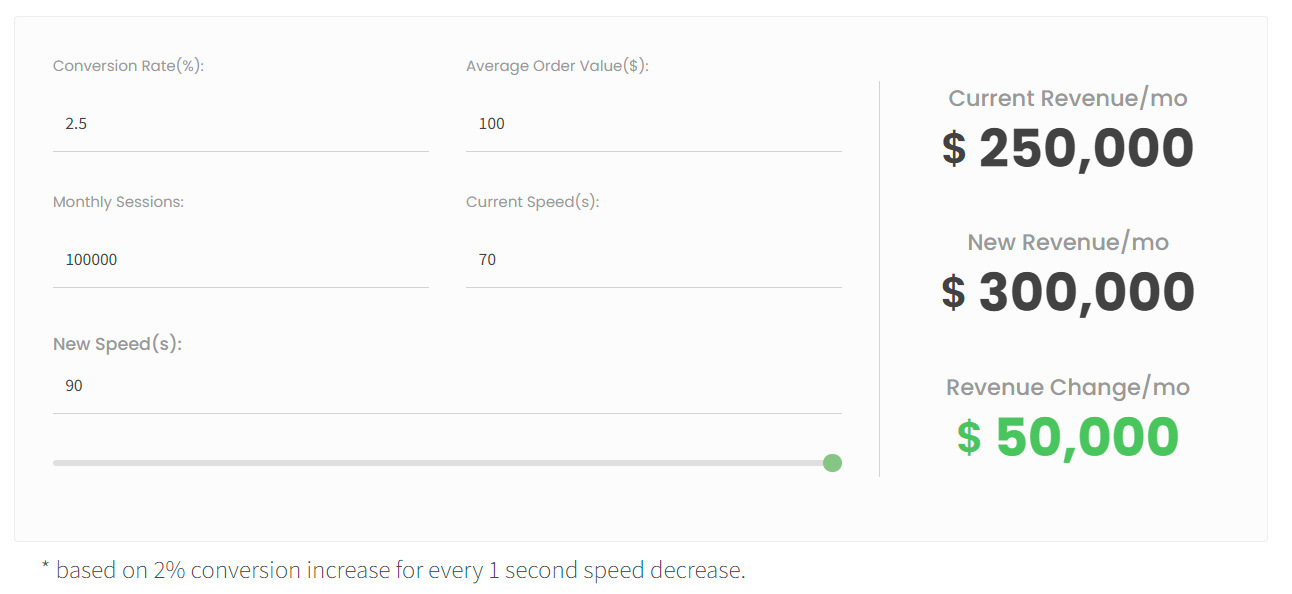
If you want your website to load up fast and secure the first spot in search engine results, you will need a fast web hosting provider with server infrastructure, CDN and caching technologies that are fully configured and optimized for speed.
The web host you choose to go with will significantly impact how fast your website loads.
How We Perform the Testing
We follow a systematic and identical process for all the web hosts we test.
- Buy hosting: First, we sign up and pay for the web host’s entry-level plan.
- Install WordPress: Then, we set up a new, blank WordPress site using the Astra WordPress theme. This is a lightweight multipurpose theme and serves as a good starting point for the speed test.
- Install plugins: Next, we install the following plugins: Akismet (for spam protection), Jetpack (security and backup plugin), Hello Dolly (for a sample widget), Contact Form 7 (a contact form), Yoast SEO (for SEO), and FakerPress (for generating test content).
- Generate content: Using the FakerPress plugin, we create ten random WordPress posts and ten random pages, each containing 1,000 words of lorem ipsum “dummy” content. This simulates a typical website with various content types.
- Add images: With the FakerPress plugin, we upload one unoptimized image from Pexels, a stock photo website, to each post and page. This helps evaluate the website’s performance with image-heavy content.
- Run the speed test: we run the last published post in Google’s PageSpeed Insights Testing tool.
- Run the load impact test: we run the last published post in K6’s Cloud Testing tool.
How We Measure Speed & Performance
The first four metrics are Google’s Core Web Vitals, and these are a set of web performance signals that are critical to a user’s web experience on both desktop and mobile devices. The last fifth metric is a load impact stress test.
1. Time to First Byte
TTFB measures the time between the request for a resource and when the first byte of a response begins to arrive. It’s a metric for determining the responsiveness of a web server and helps identify when a web server is too slow to respond to requests. Server speed is basically entirely determined by the web hosting service you use. (source: https://web.dev/ttfb/)
2. First Input Delay
FID measures the time from when a user first interacts with your site (when they click a link, tap a button, or use a custom, JavaScript-powered control) to the time when the browser is actually able to respond to that interaction. (source: https://web.dev/fid/)
3. Largest Contentful Paint
LCP measures the time from when the page starts loading to when the largest text block or image element is rendered on the screen. (source: https://web.dev/lcp/)
4. Cumulative Layout Shift
CLS measures unexpected shifts in the display of content in the loading of a web page due to image resizing, ad displays, animation, browser rendering, or other script elements. Shifting layouts lower the quality of the user experience. This can make visitors confused or require them to wait till the webpage loading is completed, which takes more time. (source: https://web.dev/cls/)
5. Load Impact
Load impact stress testing determines how the web host would handle 50 visitors simultaneously visiting the test site. Speed testing alone isn’t enough to test performance, as this test site doesn’t have any traffic to it.
To be able to evaluate the efficiency (or inefficiency) of a web host’s servers when faced with increased site traffic, we used a testing tool called K6 (formerly called LoadImpact) to send virtual users (VU) to our test site and stress test it.
These are the three load impact metrics we measure:
Average response time
This measures the average duration it takes for a server to process and respond to client requests during a specific test or monitoring period.
The average response time is a useful indicator of the overall performance and efficiency of a website. Lower average response times generally indicate better performance and a more positive user experience, as users receive quicker responses to their requests.
Maximum response time
This refers to the longest duration it takes for a server to respond to a client’s request during a specific test or monitoring period.This metric is crucial for evaluating the performance of a website under heavy traffic or usage.
When multiple users access a website simultaneously, the server must handle and process each request. Under high load, the server may become overwhelmed, leading to an increase in response times. The maximum response time represents the worst-case scenario during the test, where the server took the longest time to respond to a request.
Average request rate
This is a performance metric that measures the average number of requests per unit of time (usually per second) that a server processes.
The average request rate provides insights into how well a server can manage incoming requests under various load conditions. A higher average request rate indicates that the server can handle more requests in a given period, which is generally a positive sign of performance and scalability.
⚡Speed & Performance Test Results
The table below compares web hosting companies’ performance based on four key performance indicators: average Time to First Byte, First Input Delay, Largest Contentful Paint, and Cumulative Layout Shift. Lower values are better.
| Company | TTFB | Avg TTFB | FID | LCP | CLS |
|---|---|---|---|---|---|
| SiteGround | Frankfurt: 35.37 ms Amsterdam: 29.89 ms London: 37.36 ms New York: 114.43 ms Dallas: 149.43 ms San Francisco: 165.32 ms Singapore: 320.74 ms Sydney: 293.26 ms Tokyo: 242.35 ms Bangalore: 408.99 ms | 179.71 ms | 3 ms | 1.9 s | 0.02 |
| Kinsta | Frankfurt: 355.87 ms Amsterdam: 341.14 ms London: 360.02 ms New York: 165.1 ms Dallas: 161.1 ms San Francisco: 68.69 ms Singapore: 652.65 ms Sydney: 574.76 ms Tokyo: 544.06 ms Bangalore: 765.07 ms | 358.85 ms | 3 ms | 1.8 s | 0.01 |
| Cloudways | Frankfurt: 318.88 ms Amsterdam: 311.41 ms London: 284.65 ms New York: 65.05 ms Dallas: 152.07 ms San Francisco: 254.82 ms Singapore: 295.66 ms Sydney: 275.36 ms Tokyo: 566.18 ms Bangalore: 327.4 ms | 285.15 ms | 4 ms | 2.1 s | 0.16 |
| A2 Hosting | Frankfurt: 786.16 ms Amsterdam: 803.76 ms London: 38.47 ms New York: 41.45 ms Dallas: 436.61 ms San Francisco: 800.62 ms Singapore: 720.68 ms Sydney: 27.32 ms Tokyo: 57.39 ms Bangalore: 118 ms | 373.05 ms | 2 ms | 2 s | 0.03 |
| WP Engine | Frankfurt: 49.67 ms Amsterdam: 1.16 s London: 1.82 s New York: 45.21 ms Dallas: 832.16 ms San Francisco: 45.25 ms Singapore: 1.7 s Sydney: 62.72 ms Tokyo: 1.81 s Bangalore: 118 ms | 765.20 ms | 6 ms | 2.3 s | 0.04 |
| Rocket.net | Frankfurt: 29.15 ms Amsterdam: 159.11 ms London: 35.97 ms New York: 46.61 ms Dallas: 34.66 ms San Francisco: 111.4 ms Singapore: 292.6 ms Sydney: 318.68 ms Tokyo: 27.46 ms Bangalore: 47.87 ms | 110.35 ms | 3 ms | 1 s | 0.2 |
| WPX Hosting | Frankfurt: 11.98 ms Amsterdam: 15.6 ms London: 21.09 ms New York: 584.19 ms Dallas: 86.78 ms San Francisco: 767.05 ms Singapore: 23.17 ms Sydney: 16.34 ms Tokyo: 8.95 ms Bangalore: 66.01 ms | 161.12 ms | 2 ms | 2.8 s | 0.2 |
Time to First Byte (TTFB): TTFB measures the duration from the client making an HTTP request to the first byte of the page being received by the client’s browser. This includes the network latency of getting to the server, the time the server took to process the request, and the network latency for the response to get back to the viewer.
Rocket.net has significantly lower TTFB times across all tested locations than Kinsta. The fastest TTFB for Rocket.net was recorded in Tokyo at 27.46 ms, while the slowest was in Sydney at 318.68 ms. Kinsta, on the other hand, recorded its fastest TTFB in San Francisco at 68.69 ms and the slowest in Bangalore at 765.07 ms.
Average TTFB: The average TTFB is calculated by averaging the TTFB values from all tested locations. Rocket.net has a significantly lower average TTFB (110.35 ms) compared to Kinsta (358.85 ms), indicating that on average, pages hosted by Rocket.net load faster than those by Kinsta.
First Input Delay (FID): FID measures the time from when a user first interacts with a page to the time when the browser is able to respond to that interaction. Both companies scored the same on FID (3 ms), indicating that they are similarly responsive to user interactions.
Largest Contentful Paint (LCP): LCP measures the render time of the largest image or text block visible within the viewport. Lower values are better as they indicate faster load times. Rocket.net has a better LCP score (1 s) than Kinsta (1.8 s), indicating that Rocket.net loads the largest contentful paint faster.
Cumulative Layout Shift (CLS): CLS measures the sum total of all individual layout shift scores for every unexpected layout shift that occurs during the entire lifespan of a page. A lower CLS score is better as it indicates a more stable page. Rocket.net’s CLS score (0.2) is higher than Kinsta’s (0.01), suggesting that Kinsta provides a more stable layout with less unexpected shifts.
Rocket.net performs better than Kinsta.
Rocket.net has superior performance in terms of TTFB, average TTFB, and LCP, while Kinsta provides a more stable layout (lower CLS). They both perform similarly in terms of FID.
⚡Load Impact Test Results
The table below compares web hosting companies’ performance based on three key performance indicators: Average Response Time, Highest Load Time, and Average Request Time. Lower values are better for Average Response Time and Highest Load Time, while higher values are better for Average Request Time.
| Company | Avg Response Time | Highest Load Time | Avg Request Time |
|---|---|---|---|
| SiteGround | 116 ms | 347 ms | 50 req/s |
| Kinsta | 127 ms | 620 ms | 46 req/s |
| Cloudways | 29 ms | 264 ms | 50 req/s |
| A2 Hosting | 23 ms | 2103 ms | 50 req/s |
| WP Engine | 33 ms | 1119 ms | 50 req/s |
| Rocket.net | 17 ms | 236 ms | 50 req/s |
| WPX Hosting | 34 ms | 124 ms | 50 req/s |
Average Response Time: Average response time measures the average time it takes for the server to respond to a client’s request. Lower values are better because they indicate faster server response times. In this case, Rocket.net has a significantly lower average response time (17 ms) than Kinsta (127 ms), indicating that Rocket.net’s server responds to requests much faster than Kinsta’s server.
Highest Load Time: Highest Load Time refers to the longest amount of time it took for a page to fully load during the testing period. Lower values are preferable because they indicate the server can load even the most resource-intensive pages quickly. Rocket.net has a lower highest load time (236 ms) compared to Kinsta (620 ms), implying that Rocket.net has quicker maximum load times.
Average Request Time: Average Request Time usually refers to the average rate at which the server can handle incoming requests. Higher values are better as they indicate the server can handle more requests per second. Here, Rocket.net handles more requests per second (50 req/s) than Kinsta (46 req/s), suggesting that Rocket.net’s server can handle a slightly higher load than Kinsta’s server.
Again, Rocket.net outperforms Kinsta!
Rocket.net has superior performance in terms of Average Response Time, Highest Load Time, and Average Request Time compared to Kinsta.
Rocket.net Performance Features
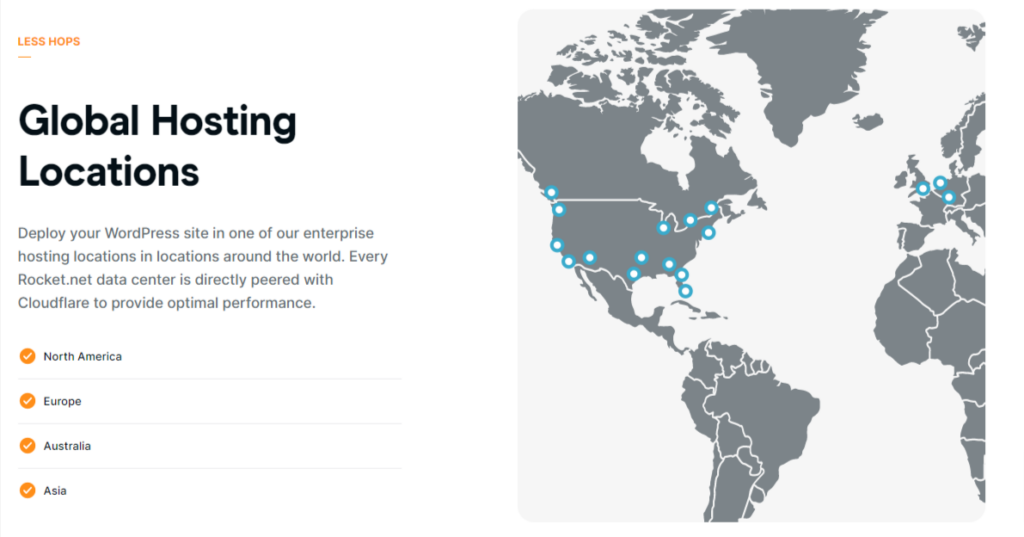
Rocket.net has an interesting setup. It uses something called “Edge of the Cloud” for its data center network. This is Cloudflare enterprise technology and provides access to over 275 PoP locations throughout the world’s largest cities.
This essentially means that your data can be delivered from a location closest to your WordPress website visitors’ location, thus reducing lag and increasing delivery speeds.
Furthermore, every “edge of the cloud” exchange features direct connectivity to a local ISP, which works to significantly reduce latency and ensures your WordPress site performance is boosted as much as possible.
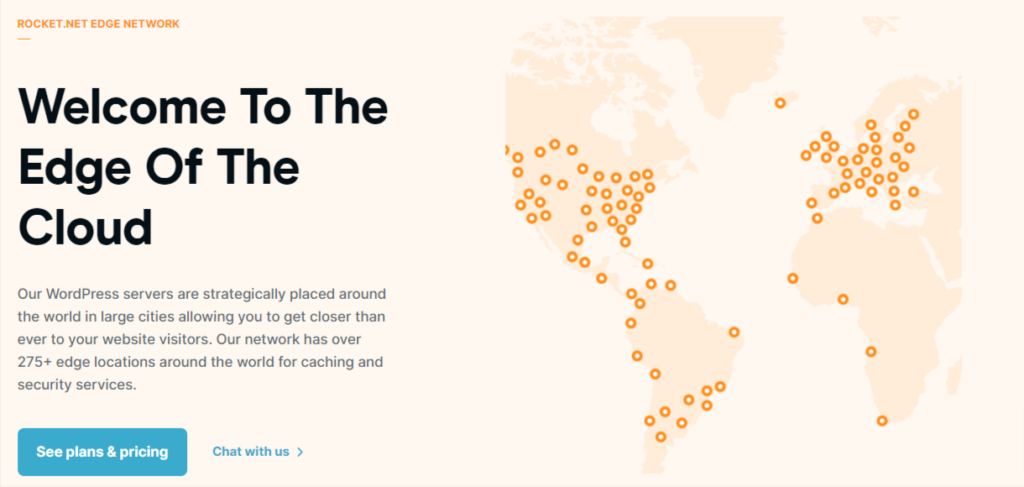
Rocket’s extensive network also features over 32 CPU cores distributed globally and utilizes NVMe physical servers. This is a top-grade technology mind, so you really are getting the best of the best.
One pretty nifty feature here is that Rocket.net automatically pre-configures and optimizes your WordPress website setup to produce the fastest possible speeds. This will satisfy those with less-than-stellar technical skills since you don’t have to waste time trying to make things work better.

These automatic optimizations are made possible thanks to the use of the Cloudflare CDN – the fastest type of enterprise-grade CDN available. This excellent piece of tech provides you with the following:
- Brotli file compression
- Argo smart routing
- Polish image optimization
- Early hints (providing speeds of up to 30% faster)
Ultimately, all of this is going to give you the fastest possible data serving speeds while maintaining an ultra-reliable service. And best of all, it doesn’t cost any extra – the Cloudflare Enterprise CDN is included in the price.

What else is there to pile on the performance?
Well, let’s not forget caching. All top hosting providers need top caching tools to ensure rapid page loading and zero lag for your website’s visitors. And Rocket delivers here too.
Using its extensive PoP network, the platform brings you a healthy number of cache features, including:
- Full page caching
- Per device caching
- Cookie cache bypass
- Automatic image optimization
- ARGO smart routing
- Tiered caching
- Free Redis and Object Cache Pro (Fully-Managed Cache & Database-As-A-Service)

Lastly, there are always a few more things to look forward to, and Rocket provides here.
The platform ensures you can always use the latest version of PHP, including Litespeed 8.0 and 8.1, plus unlimited PHP workers. And you’ve also got the use of NVMe SSD storage and HTTP3 support.
Kinsta Performance Features
Kinsta exclusively uses the Google Cloud Network for its data centers. However, the platform takes things a step further by solely utilizing the Premium Tier network. What’s this? Well, it’s the fastest and most reliable tier available and features high-performing CPUs.
In contrast, most other hosting providers that use Google Cloud can’t boast the same claim.
Since Kinsta uses Google, it means it has a huge number of data centers at your disposal. This large network of 35+ data centers is scattered throughout the world and lets users choose the closest location to where they are based. If your data center is relatively near, then you can enjoy better speeds and reliability than if it were far away.
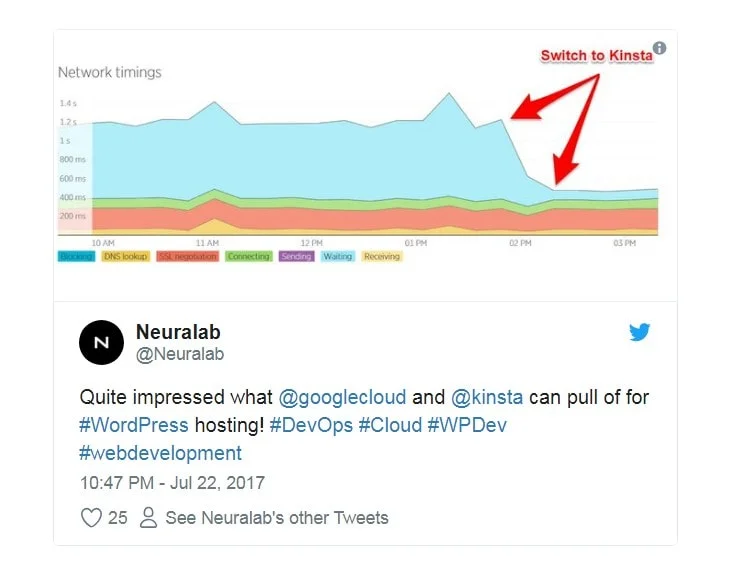
Low latency and reliable connectivity are achieved thanks to the private fiber network and can result in a performance boost of somewhere between 30% – 300% (or so Kinsta claims).
Users can also look forward to SSD storage with built-in redundancy, which ensures you maintain high data integrity. And a nice touch is that your backup copies and any staging environments you create are not counted toward your overall storage limitations.
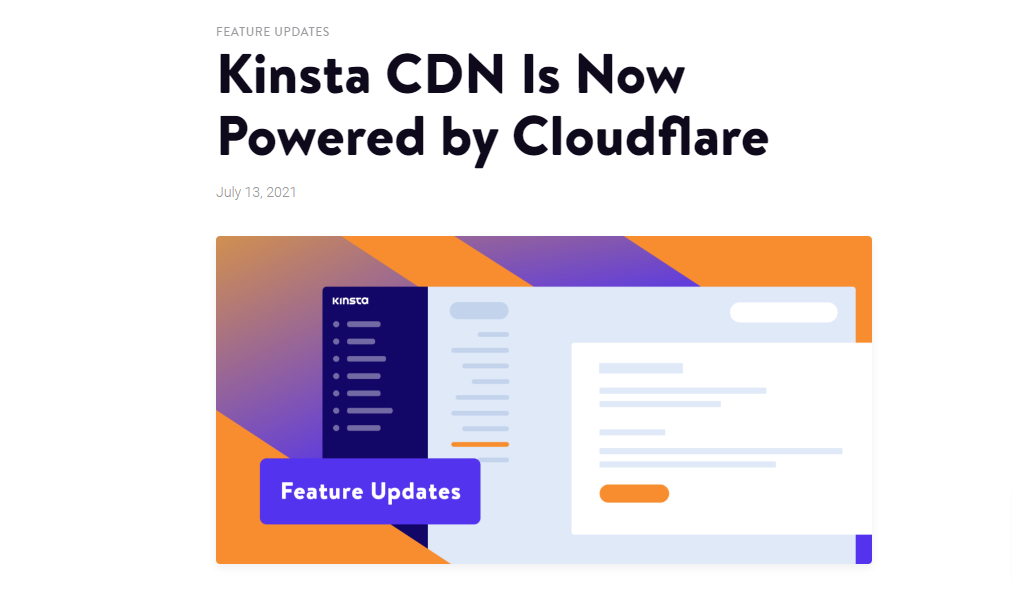
Like Rocket, Kinsta now features a CDN powered by Cloudflare. This high-performance tech serves up content blindingly fast, supports HTTP/3, and is available from Kinsta’s network of 275+ POPs locations worldwide.
Considering some platforms charge extra for the privilege of using a Cloudflare CDN (I’m looking at you, Rocket), to have this super-charged piece of tech included in the price is a welcome perk.
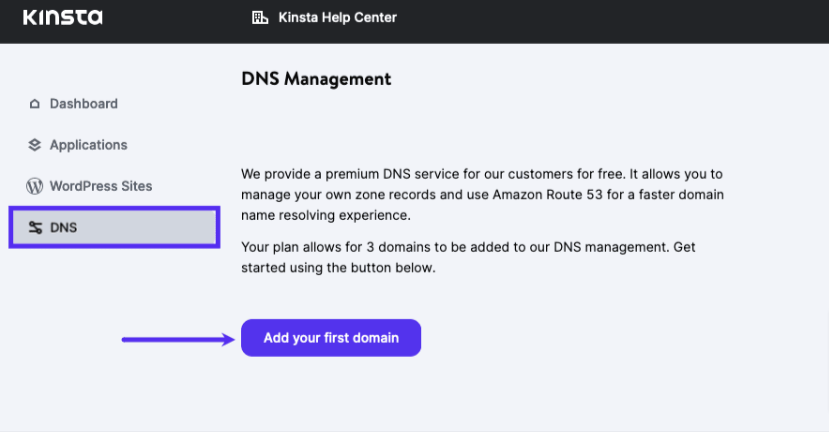
What else? Well, Kinsta features a premium Anycast DNS service. This latency support and geolocation-based routing is powered by Amazon Route53 and ensures its users get speedy response times and full stability.
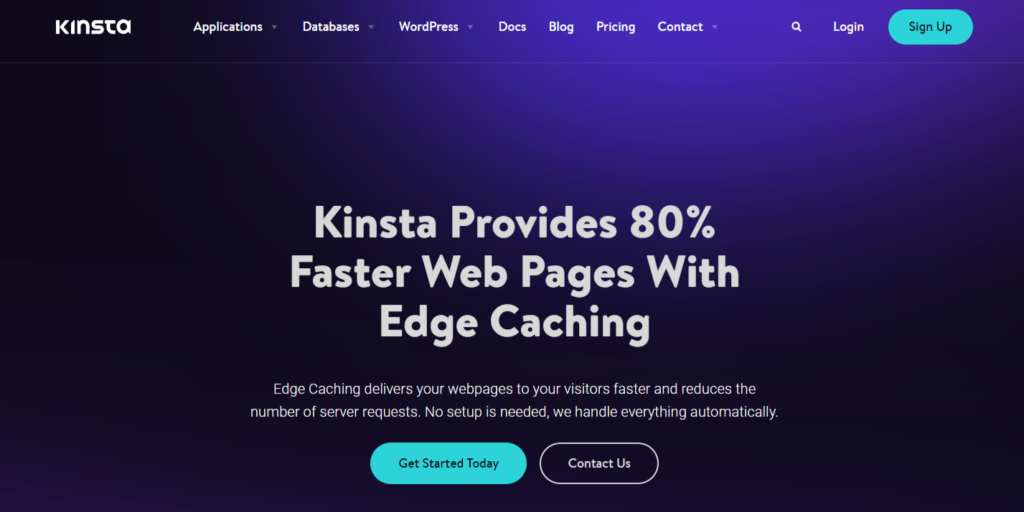
Then, to take caching to the next level, Kinsta has its own proprietary Edge Caching software. This beefy tool promises:
- 50% reduction in time to first byte (TTFB)
- 55% reduction in time to transfer complete pages,
- 50% reduction in time to serve cached HTML WordPress.
I can’t argue with those figures! They’re pretty impressive and mean your site traffic will encounter a smooth-running and fast-loading site with zero lag.
But wait, there’s more. Kinsta also thoughtfully provides:
- 8.0 and 8.1 PHP support (always the latest version)
- Automatic updates for WordPress and the Kinsta platform
- One-click site management tools and a user-friendly interface
- CDN enablement and disablement
- Image optimization controls such as CSS and JS minification and excluding files.
- Cloudflare “Early Hints” web standard (improving speeds of up to a further 30%)
🏆 Winner is Rocket.net
In our comparisons of web hosting companies performances across various metrics, Rocket.net consistently outperforms Kinsta in the following areas:
- Time to First Byte (TTFB): Rocket.net displayed significantly lower TTFB times across all tested locations compared to Kinsta. The average TTFB was also lower for Rocket.net.
- Largest Contentful Paint (LCP): Rocket.net had a faster LCP time, indicating that it loads the largest image or text block visible within the viewport quicker than Kinsta.
- Average Response Time: Rocket.net’s server responds to client requests much quicker than Kinsta’s, as indicated by a significantly lower average response time.
- Highest Load Time: Rocket.net had a lower highest load time, suggesting that even its most resource-intensive pages load more quickly than those hosted by Kinsta.
- Average Request Time: Rocket.net’s server can handle more requests per second than Kinsta’s, indicating a higher server load capacity.
In our tests, Rocket.net demonstrated better speed and responsiveness, which are key factors in website performance and user experience.
Did you know that Rocket.net also came out as the #1 winner in our test of the fastest WordPress hosting companies?
Security
Security is of the utmost importance if you plan on keeping those malicious nasties at bay. Most hosting providers pack a serious punch where security features are concerned. Let’s see how the two platforms fare in this department.
Rocket.net Security Features
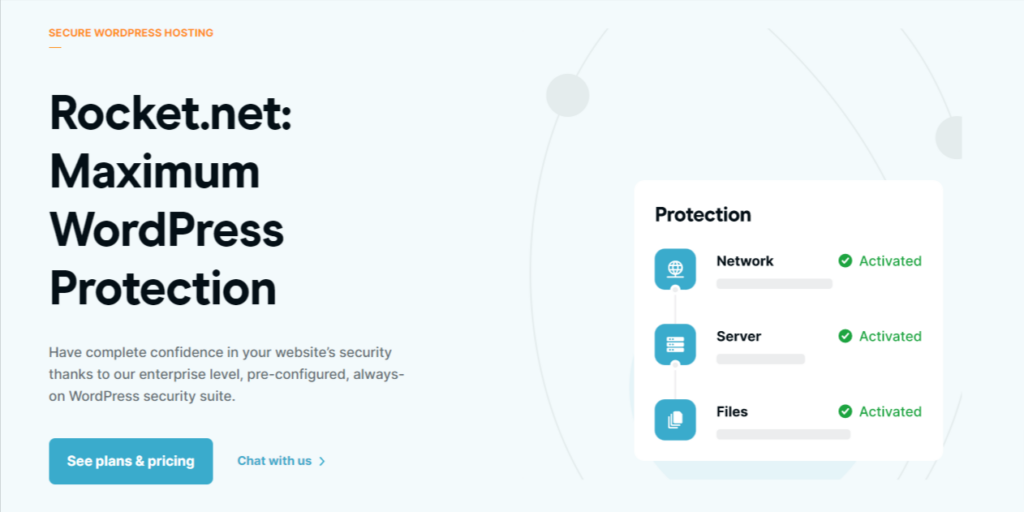
Rocket.net provides the same security across all its IaaS providers. Needless to say, its top-notch and will provide you with all the reassurance and safety you need to host your site without worrying about falling foul of malicious attacks.
Here’s what you get:
- Enterprise-level security
- Cloudflare enterprise WAF
- Preconfigured and automatically optimized for maximum security
- 100% PCI compliant
- Malicious threat detection and elimination
- Imunify360 – real-time malware scanning with zero performance impact
- Unlimited free SSL certificates
- Automatic updates and bug patching
- Full activity logging
- Automatic daily backups
- 14-day backup retention
Kinsta Security Features
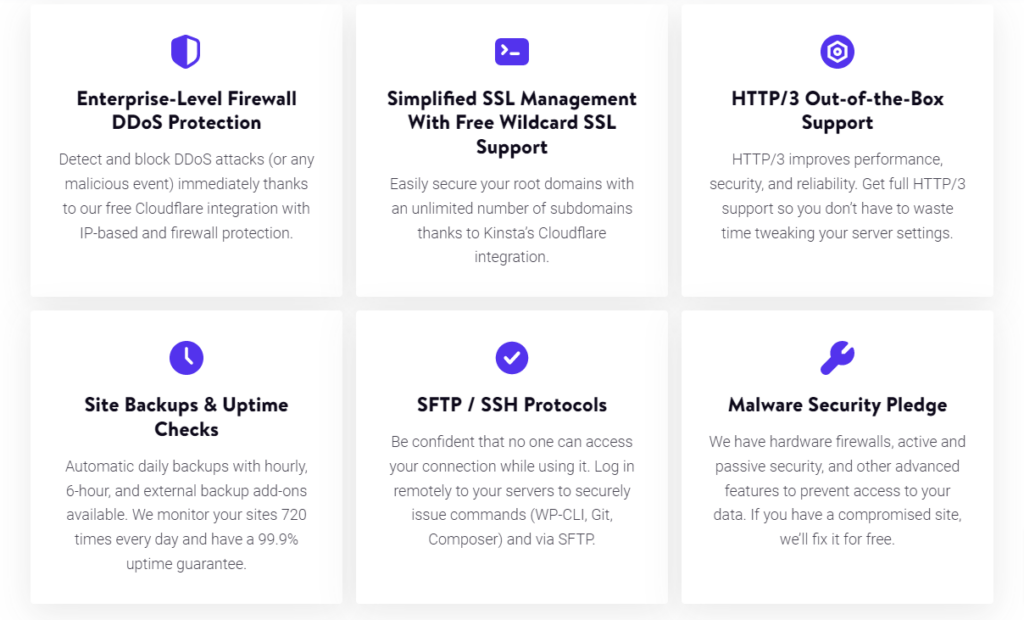
Kinsta doubles down on its security detail and doesn’t waste any time bringing you the best features money can buy. I mean, for the high premium, one would expect to receive this level of security anyway, so it’s reassuring that Kinsta doesn’t disappoint in this department.
In fact, Kinsta is so confident in its security features it has a hack-free guarantee. Should anything nefarious manage to barge its way in, Kinsta will provide a full fix completely for free.
And here’s everything else the platform provides to keep your sites safe:
- 99.9% uptime SLA
- Enterprise-level firewall DDoS protection
- SSL management
- HTTP/3 support
- SFTP/SSH protocols
- Automatic daily backups
- Backup copies stored of up to 14 days
- Staging environment for you to safely test new plugins and site changes before applying them to the live site
- Malware security pledge (hardware firewalls and active and passive security)
- Free Cloudflare wildcard SSL support
- 2-factor authentication
- IP banning (after six failed login attempts)
🏆 Winner is Kinsta
Rocket.net does have some good stuff and will keep your site secure in most cases. However, Kinsta wins this one, hands down.
You’ve got everything that Rocket provides and so much more, including the hack-free guarantee, a staging environment, and extra security layers like 2-factor authentication and more. It’s robust and comprehensive. I can’t fault it.
Customer Support
There are always going to be issues that we can’t resolve ourselves. This is why excellent customer service is a must. If your site goes down, being able to reach someone is vital so you can get your site back on track ASAP.
Rocket.net Support
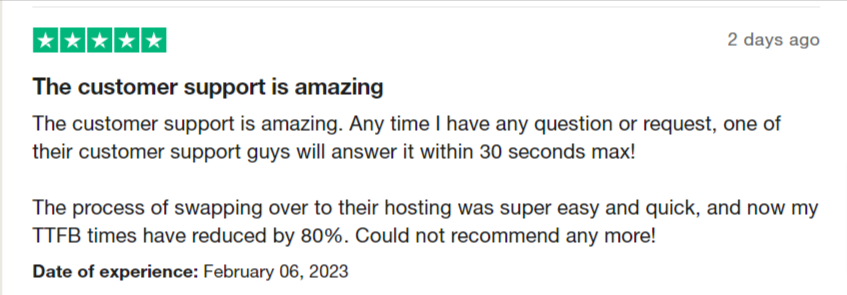
Rocket is highly renowned for providing stellar customer support for its subscribers. Indeed, many of the reviews you can find online rave about just how good it is.
The platform provides 24/7 live chat support plus phone and email support should you also require it. Additionally, customer service agents aren’t gatekeepers to more knowledgeable individuals. They actually know their stuff and can generally solve your issue in one hit.
We got in touch with Rocket via live chat, and the response was instantaneous, while the phone was answered within a couple of minutes.
All in all, I can’t fault Rocket on their customer service one iota.
Kinsta Support
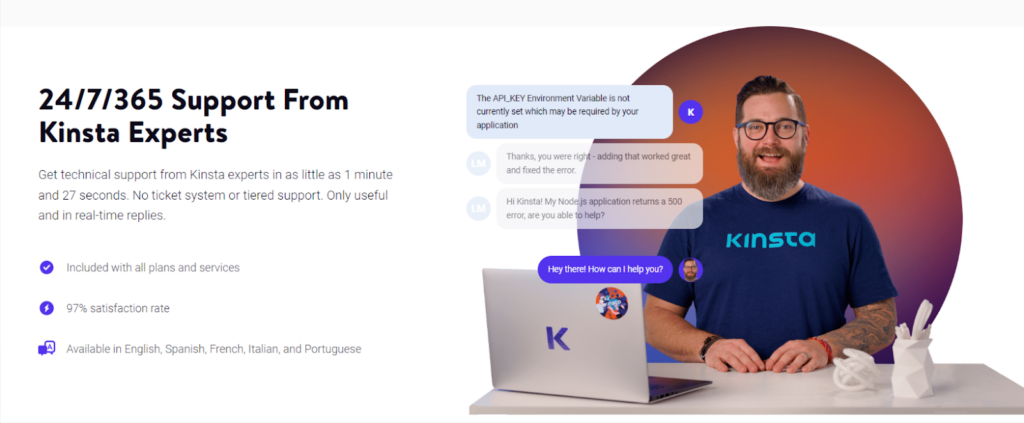
Kinsta has 24/7 live chat support available 365 days a year. While this is provided in English, there are live support agents operating in French, Spanish, Italian, and Portuguese also. However, these agents work to a Monday – Friday schedule during office hours.
There is also an email ticketing service you can use anytime. Plus, if you really need to speak to someone on the phone, you can ping an email requesting a callback.
Live chat response times for Kinsta were around 3-4 minutes when we tested out the service. This is definitely more than acceptable for most people.
🏆 Winner is Rocket.net
Honestly? I can’t fault the service provided by Rocket. The response times were instantaneous, and the level of knowledge and expertise demonstrated by the support agents was stellar. 10/10 to Rocket!
Questions & Answers
Our Verdict ⭐
It’s quite a close call, and this is largely because of the infrastructure and security features provided by both platforms. Each of them is excellent, and you won’t be disappointed by choosing either platform.
However, when it comes down to price, performance, and customer service, Rocket.net is tough to beat.
Grow your business with lightning-fast, secure and fully-optimized websites that are easy to set up & manage.
- Free Cloudflare Enterpris SSL, CDN, WAF
- Free Malware Protection
- 24x7 Expert Support & Unlimited Free Migrations
It has more affordable plans with more generous traffic and storage limits, and well, you can’t argue with the numerous online reviews that gush about how amazing its service is.
And, having tried out the customer service myself, I can attest to its greatness.
So there we go, Rocket.net is the winner of this particular battle. Want to see for yourself? Try it out for just $1.
How We Review Web Hosts: Our Methodology
When we review web hosts, our evaluation is based on these criteria:
- Value for Money: What types of web hosting plans are on offer, and are they good value for money?
- User Friendliness: How user-friendly is the signup process, the onboarding, the dashboard? and so on.
- Customer Support: When we need help, how quickly can we get it, and is the support effective and helpful?
- Hosting Features: What unique features does the web host provide, and how do they stack up against competitors?
- Security: Are essential security measures like SSL certificates, DDoS protection, backup services, and malware/virus scans included?
- Speed and Uptime: Is the hosting service fast and reliable? What types of servers do they use, and how do they perform in tests?
For more details on our review process, click here.

